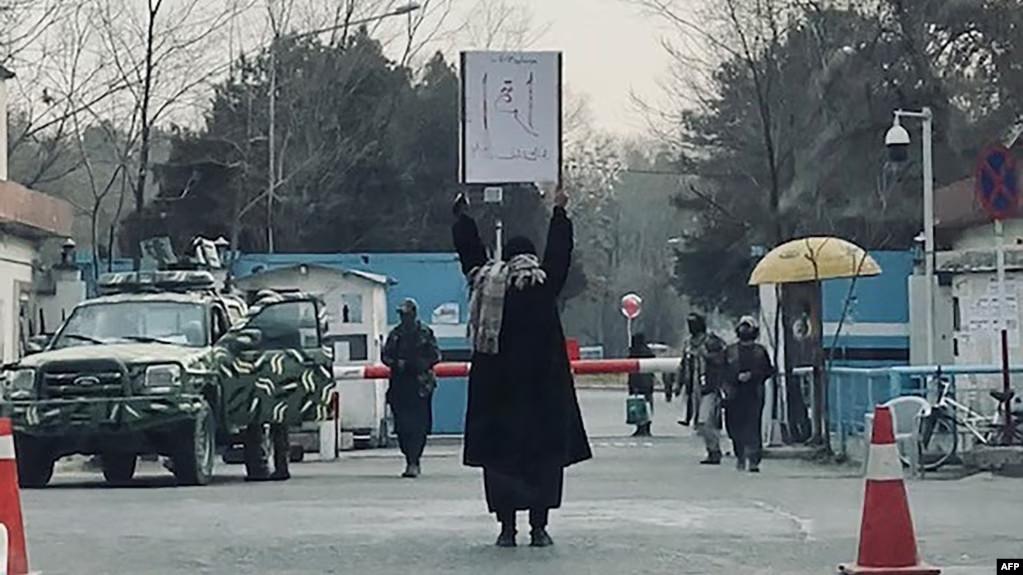
Taliban’s Female University Education Ban Marks One Year
The United States and human rights defenders Thursday renewed a call for Afghanistan’s ruling Taliban to allow female students to return to universities and ensure that women have access to education at all levels.
This week marks one year since the exclusively male Taliban government abruptly suspended women’s attendance in public and private higher education institutions, making impoverished Afghanistan the only country in the world to officially ban girls from education from grade seven onward.
Thomas West, the U.S. special representative for Afghanistan, called the yearlong university education ban “indefensible.”
He wrote on X, formerly known as Twitter, that the crisis-hit South Asian nation “needs a generation of future female doctors, engineers, business leaders, educators to grow & prosper & stand on its own feet.”
“For the sake of Afghanistan’s future and our own interests in a stable region, we must keep women’s access to education at all levels at the very center of our priorities,” West added.
The Taliban returned to power in August 2021 and imposed their strict interpretation of Islamic law, placing sweeping restrictions on Afghan women’s access to education and work.
The Islamist rulers have dismissed international criticism of their policies, saying they are aligned with local culture and Islamic law.
Rina Amiri, the U.S. special envoy for Afghan women, girls, and human rights, questioned the Taliban’s claims Thursday and blasted de facto rulers for stripping half the country’s population of their basic rights.
“We must all stand firmly with the Afghan people, particularly women & girls, as they call on us to counter these policies and remember that they are not borne of Afghan culture, but of Taliban ideology,” Amiri wrote on X.
Taliban Higher Education Minister Nada Mohammad Nadim told a graduation ceremony for hundreds of male students at the main university in the Afghan capital, Kabul, that his government is committed to developing and progressing education in the country.
Nadim did not elaborate or discuss matters related to female higher education, which his ministry suspended last year.
“Foreigners offer suggestions for the development of Afghanistan; in reality, they do not want the country’s development,” the Taliban minister said in an apparent response to international criticism.
Canadian Women for Women in Afghanistan, a charitable organization, blamed what it called “gender apartheid policies” of the Taliban for directly contributing to worsening humanitarian conditions in the country, reeling from years of war and natural disasters.
The United Nations says nearly two-thirds of Afghans need food and other aid.
“Excluding half the population from accessing higher education is a grave abuse of human rights, but will also debilitate Afghanistan’s economic future by cutting off the supply of educated professionals the country needs not just to develop and advance, but just to function,” said Lauryn Oates, executive director of the organization.
“This, and other discriminatory policies, are taking the country backward and causing irreparable harm,” she added in the statement released in connection with the ban on female university education. It also invited Canadian and other foreign higher education institutions to open their doors to Afghan women.
Roza Otunbayeva, U.N. special envoy in the country, told a Security Council meeting Wednesday that her mission is seeking to verify reports that the Taliban are allowing girls of all ages to study at traditionally boys-only Islamic religious schools, known as madrassas.
The envoy said the United Nations is receiving “more and more anecdotal evidence” that girls can study at madrassas. “It is not entirely clear, however, what constitutes a madrassa, if there is a standardized curriculum that allows modern education subjects, and how many girls are able to study in madrassas,” Otunbayeva said.
She said Taliban education authorities “continue to tell us that they are working on creating conditions to allow girls to return to school. But time is passing while a generation of girls is falling behind.”
“The quality of education in Afghanistan is a growing concern. The international community has rightly focused on the need to reverse the ban on girls’ education, but the deteriorating quality of education and access to it is affecting boys as well,” Otunbayeva said.
She said the lack of progress in resolving human rights issues is a key factor behind the current impasse between the Taliban and other countries.
No nation has formally recognized the Taliban government, citing its harsh treatment of women and other human rights concerns. The U.N. has also turned down Taliban demands to allow their nominee to represent Afghanistan at the world body.
“Accepting and working to uphold the international norms and standards, as set out in the U.N. treaties that Afghanistan has ratified, will continue to be a nonnegotiable condition for a seat at the United Nations,” Otunbayeva told the Wednesday meeting.
Source » voanews





